Customer Logins
Obtain the data you need to make the most informed decisions by accessing our extensive portfolio of information, analytics, and expertise. Sign in to the product or service center of your choice.
Customer Logins
ECONOMICS COMMENTARY
May 07, 2015
Asia acts as brake on global economic growth
Global economic growth remained robust in April, slowing only modestly from March's six-month high. However, growth is heavily skewed towards the services economies of the developed world. Manufacturing growth turned down further, especially in emerging markets.
US and Europe drive global growth
The JPMorgan Global PMI, compiled by Markit from its national survey data, fell from 54.8 in March to 54.2 in April, but remained well above the 50.0 no-change level to indicate a solid monthly expansion of business activity. The latest reading is broadly consistent with worldwide GDP expanding at a robust but unexciting annual rate of 2.5%, up from 2.0% at the end of last year.
Global economic growth
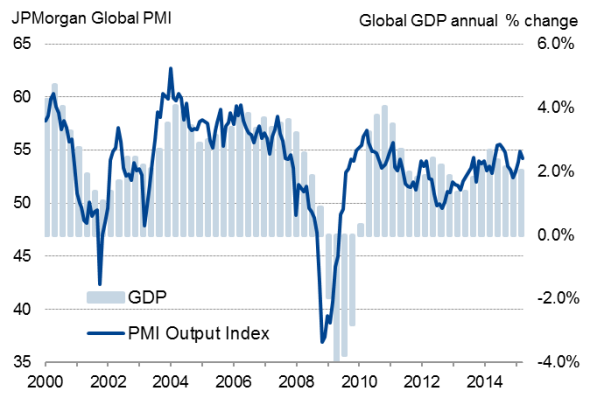
Growth continued to be led by the developed world, where the rate of expansion dipped only slightly from March's seven-month high. The UK overtook the US as the fastest growing major economy, though the survey data for both countries continued to signal strong annualised GDP growth of approximately 3%. The euro area also continued to expand, reviving from last year's slowdown, with the PMI running at a level consistent with annualised growth of 1.5-2.0%.
Developed world
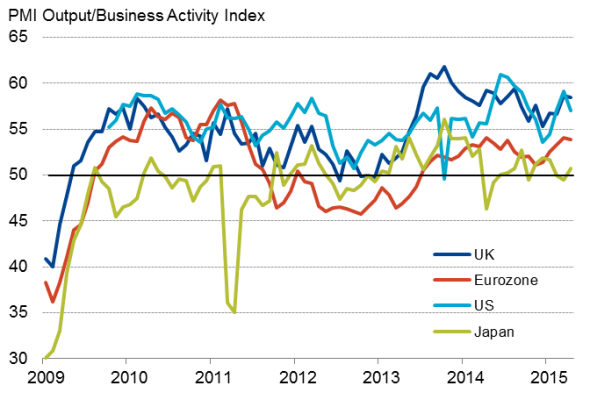
Asian malaise
In contrast to the robust expansions observed in the US and Europe, ongoing weakness was again seen in Asia, where the pace of expansion in the region remained close to stagnation.
US, Asia and Europe
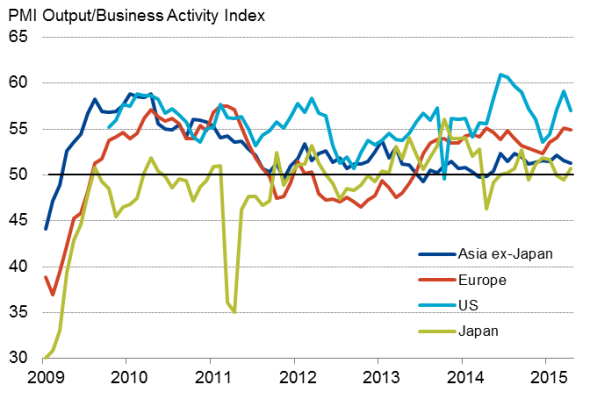
Growth almost stalled in China, and business activity barely grew in Japan, albeit with the latter representing an improvement on the mild downturn seen in March. Growth in India meanwhile hit a six-month low and manufacturing contractions were seen in Taiwan, South Korea and Indonesia.
Emerging market stagnation
The weakness of growth in the emerging markets was not limited to Asia. Brazil saw business activity contract at the fastest rate since March 2009, heralding a renewed recession. There was better news in Russia, where growth was recorded for the first time in seven months, but the overall rate of expansion was only marginal.
Emerging markets
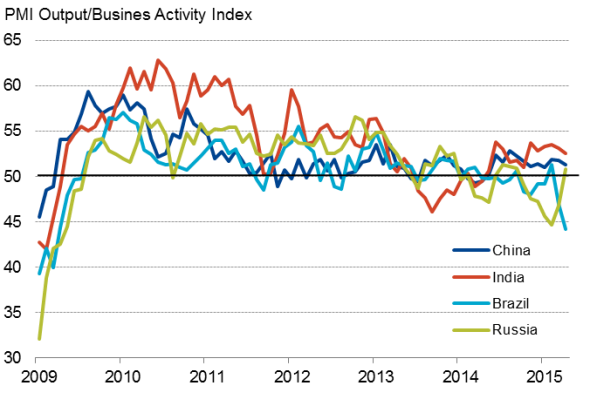
Manufacturing slowdown
There was also a divergence by sector. While worldwide service sector growth remained robust, global manufacturing output expanded at the weakest rate for almost two years amid a stalling of global trade.
The weakness of manufacturing was especially visible in the emerging markets. China's manufacturing economy contracted for the fourth time in the past five months, with the headline PMI hitting a 12-month low, while Russia also continued to see an ongoing contraction of its manufacturing economy, albeit with the pace of decline easing.
However, factory output in the developed world also grew at the slowest rate since July 2013. Worst performing among the four largest developed economies was Japan, where the PMI signalled the first (albeit marginal) contraction for 11 months, but growth also edged lower in the US, UK and eurozone.
Job creation centred on developed world service sector
The divergent trends between the developed and emerging markets, and the manufacturing and services economies, was further highlighted by the labour market. Only in the developed world services economy was any notable employment growth recorded in April.
Asia also remained a key weak-spot in the global labour market picture, with staffing levels broadly stagnating, having failed to register any meaningful growth since January.
Global manufacturing and services
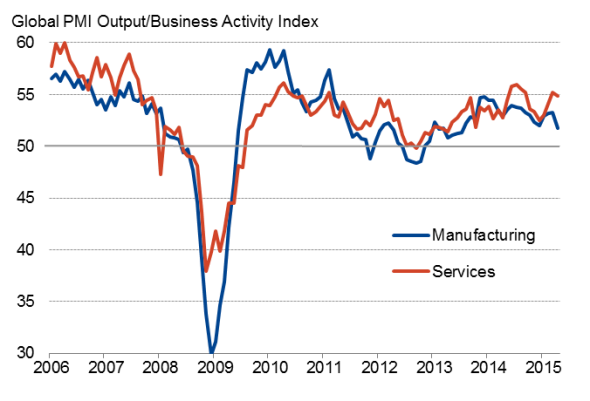
Sources for all charts: Markit, JPMorgan, HSBC
Chris Williamson | Chief Business Economist, IHS Markit
Tel: +44 20 7260 2329
chris.williamson@ihsmarkit.com
{"items" : [
{"name":"share","enabled":true,"desc":"<strong>Share</strong>","mobdesc":"Share","options":[ {"name":"facebook","url":"https://www.facebook.com/sharer.php?u=http%3a%2f%2fwww.spglobal.com%2fmarketintelligence%2fen%2fmi%2fresearch-analysis%2f07052015-economics-asia-acts-as.html","enabled":true},{"name":"twitter","url":"https://twitter.com/intent/tweet?url=http%3a%2f%2fwww.spglobal.com%2fmarketintelligence%2fen%2fmi%2fresearch-analysis%2f07052015-economics-asia-acts-as.html&text=Asia+acts+as+brake+on+global+economic+growth","enabled":true},{"name":"linkedin","url":"https://www.linkedin.com/sharing/share-offsite/?url=http%3a%2f%2fwww.spglobal.com%2fmarketintelligence%2fen%2fmi%2fresearch-analysis%2f07052015-economics-asia-acts-as.html","enabled":true},{"name":"email","url":"?subject=Asia acts as brake on global economic growth&body=http%3a%2f%2fwww.spglobal.com%2fmarketintelligence%2fen%2fmi%2fresearch-analysis%2f07052015-economics-asia-acts-as.html","enabled":true},{"name":"whatsapp","url":"https://api.whatsapp.com/send?text=Asia+acts+as+brake+on+global+economic+growth http%3a%2f%2fwww.spglobal.com%2fmarketintelligence%2fen%2fmi%2fresearch-analysis%2f07052015-economics-asia-acts-as.html","enabled":true}]}, {"name":"rtt","enabled":true,"mobdesc":"Top"}
]}



